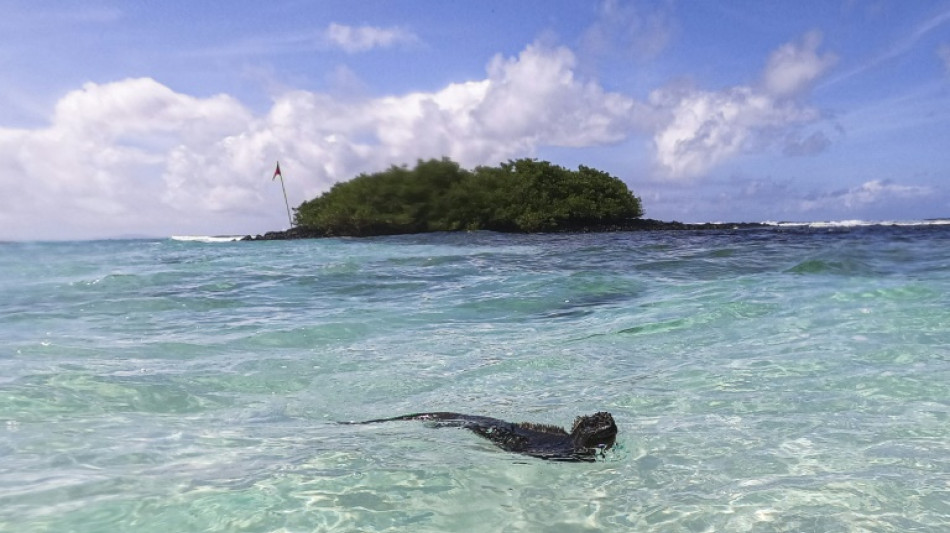
-
 Ronaldo at double as Portugal reach Nations League quarters, Spain win
Ronaldo at double as Portugal reach Nations League quarters, Spain win
-
Fitch upgrades Argentina debt rating amid economic pain

-
 Trump picks Doug Burgum as energy czar in new administration
Trump picks Doug Burgum as energy czar in new administration
-
Phone documentary details struggles of Afghan women under Taliban

-
 Ronaldo shines as Portugal rout Poland to reach Nations League last-eight
Ronaldo shines as Portugal rout Poland to reach Nations League last-eight
-
Spain beat Denmark to seal Nations League group win

-
 Former AFCON champions Ghana bow out as minnows Comoros qualify
Former AFCON champions Ghana bow out as minnows Comoros qualify
-
Poland, Britain reach BJK Cup quarter-finals

-
 At summit under Trump shadow, Xi and Biden signal turbulence ahead
At summit under Trump shadow, Xi and Biden signal turbulence ahead
-
Lebanon said studying US truce plan for Israel-Hezbollah war

-
 Xi warns against 'protectionism' at APEC summit under Trump cloud
Xi warns against 'protectionism' at APEC summit under Trump cloud
-
Nigerian UN nurse escapes jihadist kidnappers after six years

-
 India in record six-hitting spree to rout South Africa
India in record six-hitting spree to rout South Africa
-
George tells England to prepare for rugby 'war' against Springboks

-
 Pogba's Juve contract terminated despite doping ban reduction
Pogba's Juve contract terminated despite doping ban reduction
-
Ukraine slams Scholz after first call with Putin in two years

-
 Michael Johnson's Grand Slam Track series to have LA final
Michael Johnson's Grand Slam Track series to have LA final
-
Kagiyama, Yoshida put Japan on top at Finland Grand Prix

-
 Alcaraz eyeing triumphant Davis Cup farewell for Nadal after ATP Finals exit
Alcaraz eyeing triumphant Davis Cup farewell for Nadal after ATP Finals exit
-
Xi, Biden at Asia-Pacific summit under Trump trade war cloud

-
 India go on record six-hitting spree against South Africa
India go on record six-hitting spree against South Africa
-
France skipper Dupont says All Blacks 'back to their best'

-
 Trump pressures US Senate with divisive cabinet picks
Trump pressures US Senate with divisive cabinet picks
-
Bagnaia strikes late in Barcelona practice to edge title rival Martin

-
 High-ball hero Steward ready to 'front up' against South Africa
High-ball hero Steward ready to 'front up' against South Africa
-
Leader of Spain flood region admits 'mistakes'

-
 Swiatek, Linette take Poland past Spain into BJK Cup quarter-finals
Swiatek, Linette take Poland past Spain into BJK Cup quarter-finals
-
Leftist voices seek to be heard at Rio's G20 summit

-
 Wales coach Jenkins urges players to 'get back on the horse'
Wales coach Jenkins urges players to 'get back on the horse'
-
Zverev reaches ATP Finals last four, Alcaraz out

-
 Boeing strike will hurt Ethiopian Airlines growth: CEO
Boeing strike will hurt Ethiopian Airlines growth: CEO
-
Springboks skipper Kolisi wary of England's 'gifted' Smith

-
 End of a love affair: news media quit X over 'disinformation'
End of a love affair: news media quit X over 'disinformation'
-
US finalizes up to $6.6 bn funding for chip giant TSMC

-
 Scholz urges Ukraine talks in first call with Putin since 2022
Scholz urges Ukraine talks in first call with Putin since 2022
-
Zverev reaches ATP Finals last four, Alcaraz on brink of exit

-
 Lebanon rescuer picks up 'pieces' of father after Israel strike
Lebanon rescuer picks up 'pieces' of father after Israel strike
-
US retail sales lose steam in October after hurricanes

-
 Zverev reaches ATP Finals last four with set win against Alcaraz
Zverev reaches ATP Finals last four with set win against Alcaraz
-
Kerevi back for Australia against Wales, Suaalii on bench

-
 Spate of child poisoning deaths sparks S.Africa xenophobia
Spate of child poisoning deaths sparks S.Africa xenophobia
-
Comedian Conan O'Brien to host Oscars

-
 Rozner overtakes McIlroy and Hatton for Dubai lead
Rozner overtakes McIlroy and Hatton for Dubai lead
-
Mourners bid farewell to medic killed in east Ukraine

-
 Gore says 'absurd' to hold UN climate talks in petrostates
Gore says 'absurd' to hold UN climate talks in petrostates
-
Hamas says 'ready for ceasefire' as Israel presses Gaza campaign

-
 Amorim says Man Utd is 'where I'm supposed to be'
Amorim says Man Utd is 'where I'm supposed to be'
-
Japan hammer Indonesia to edge closer to World Cup spot

-
 Jeff Beck guitar collection to go under the hammer in January
Jeff Beck guitar collection to go under the hammer in January
-
Veteran Ranieri has 'no time for mistakes' on Roma return


Adapt now as hotter marine heatwaves hit: scientists
Conservationists and the fishing and tourism industries must take pre-emptive measures to protect wildlife and livelihoods as the El Nino phenomenon amplifies marine heatwaves already made more intense and frequent by climate change, scientists said on Wednesday.
The naturally occurring weather pattern originates in the Pacific Ocean and drives increased heat worldwide, bringing drought to some areas and heavy rains elsewhere.
The central and eastern Pacific, parts of the western United States, Ecuador, Peru and the Indian Ocean are most likely to be hit hardest by longer and intensified heatwaves.
Historical data show these regions to be vulnerable to mass die-offs of marine habitats including coral reefs and kelp forests, nine experts wrote in a comment in the journal Nature.
Preparing for the heatwaves in the months ahead would stave off or soften their consequences, buying precious time for species, ecosystems and connected industries to adapt, they said.
The extreme events "show us what the long-term future might be like under climate change, when these warm ocean temperatures will be experienced every day", said report co-author Alistair Hobday.
"A combination of climate warming and extreme events will make life difficult for species that are already living close to their maximum tolerance," like corals, he told AFP.
Authorities should set up warning systems so local communities can act, for instance, by relocating fish species to cooler waters, reducing harvest quotas, or closing fishing areas altogether, the scientists noted.
These can range from ocean weather forecasts reliable a week in advance to long-term climate projections that take into account manmade greenhouse gas emissions.
Improved forecasting that uses models combining ocean and atmospheric models, and assessing the accuracy of their predictions, is "crucial" for local biodiversity conservation, the experts said.
Indigenous and local communities should lead intensified monitoring and planning efforts as they are well placed to notice early changes in the environment, they added.
- 'Permanent heatwave state' -
Marine heatwaves disrupt ecosystems, killing some species and forcing others to migrate to cooler waters.
The climate crisis could create a "permanent heatwave state", meaning species and ecosystems can no longer survive in some regions, the authors wrote.
Catches can be reduced for several years, as happened in the crab and scallop fisheries off western Australia after a 2011 warming event.
Species migration can also affect fish market prices, employment and quota management.
Snorkelling and diving firms could reduce staff numbers during marine heatwaves or change their activities to minimise job losses, the researchers suggested.
Adapting to climate change has taken on a greater role in public policy in addition to mitigating its effects.
At climate negotiations in Egypt last year, UN chief Antonio Guterres unveiled a five-year plan costing $3.1 billion to build a global early warning system for deadly and costly extreme weather events amplified by climate change.
El Nino events, which occur every two to seven years, are marked by warmer-than-average sea surface temperatures in the central and eastern Pacific near the Equator, and last about nine to 12 months.
This year has already seen unprecedented marine heatwaves, with record-high temperatures measured in the Mediterranean, the North Atlantic and off Florida.
The current El Nino "could be as strong" as the previous one recorded in 2015-2016 but is developing more slowly, Hobday said.
K.Brown--BTB


